Several research chairs, as well as a network and laboratories, are directly or indirectly affiliated with the International Centre for Comparative Criminology. Directed by our researchers or at least essential to the realization of their research, these research infrastructures are spread across several universities in Quebec, namely the Université de Montréal, Université du Québec à Trois-Rivières, McGill University, and Université Laval.
Below is a brief presentation of these main research entities:
Étienne Blais holds the Research Chair on the Prevention of Armed Violence in the Metropolitan Region of Montreal (2023-2028).
Funded through a partnership between the Quebec Research Fund - Society and Culture (FRQSC) and the Secretariat for the Metropolitan Region — Ministry of Municipal Affairs and Housing (MAMH), the main objective of this chair is to gain a better understanding of the phenomenon of armed violence in urban areas and to develop innovative and structuring interventions in the prevention of armed violence to maintain a safe living environment.
Anne Crocker holds the Canada Research Chair in Mental Health and Access to Justice (Level 1) (2022-2029).
Funded by the Social Sciences and Humanities Research Council (SSHRC), the main objective of this chair is to produce knowledge to better understand the experiences, needs, and outcomes of individuals who have undergone judicial treatment in mental health, with the aim of developing projects to promote access to justice for these individuals.
Research within this chair is organized around three axes: (1) the state of judicial and hospital practices in mental health, (2) Judicialization and access to justice, and (3) Social innovations and action research.
Miriam Cohen holds the Canada Research Chair in International Justice and Fundamental Rights (Level 2) (2022-2027).
Funded by the Social Sciences and Humanities Research Council (SSHRC), the main objective of the chair is to generate knowledge related to the protection of human rights and mechanisms for redress for victims in an international context.
The research of this chair focuses primarily on two axes: (1) international justice and redress for international crimes and human rights violations, and (2) the relationship between human rights, new technologies, and the empowerment of individuals and communities.
Annie Gendron and Andrée-Ann Deschênes jointly hold the Research Chair UQTR-ENPQ - Prevention of Psychological Health at Work in Public Safety (2022-2027).
Funded through a partnership between the Université du Québec à Trois-Rivières (UQTR) and the École nationale de police du Québec (ENPQ), the primary objective of this chair is to develop scientific knowledge and identify the best methods for preventing psychological health issues in the workplace, with a focus on supporting individuals working in public safety and their organizations.
The research within this chair is organized around three axes: (1) preventing the onset, (2) reducing the prevalence of the development of a disorder, and (3) intervening to address symptoms.
Cyril Muehlethaler holds the Junior UQTR Research Chair on Mobile Technologies in Forensic Investigation (2023-2026).
Upcoming information.
Elsa Euvrard holds the Research Chair on the Social Reintegration of Offenders (2018-2025).
Funded through a partnership between Laval University (ULaval), the Ministry of Public Security (MSP), and the Ministry of Justice of Quebec (MJQ), the main objective of the chair is to advance knowledge and practices related to social reintegration, taking into consideration the situations and experiences of more vulnerable individuals within the justice system.
Research within this chair is organized around three axes: (1) penal policies, (2) penal practices, and (3) penal experiences.
Maxime Bérubé holds the UQTR (Junior) Research Chair in Digital Forensics (2022-2025).
Funded by the Université du Québec à Trois-Rivières (UQTR), the main objective of the chair is to develop and disseminate novel knowledge on the identification, exploitation, and interpretation of digital traces in forensic science.
Marie Manikis holds the William Dawson Chair (2019-2024).
This chair is awarded by McGill University to a researcher of world-class caliber who conducts exceptional and original work and is on track to become a leader in their field.
This observatory, directed by Céline Bellot, is funded by a partnership grant from the Social Sciences and Humanities Research Council (SSHRC) (2020-2027).
The Observatory of Profiling (ODP), comprised of 37 researchers, including Marianne Quirouette (researcher at CICC), and 19 field partners, has been established as a strategic learning community. Providing oversight and vigilance, its aim is to generate new knowledge about profiling practices and experiences, as well as advocate for changes in policies and institutional practices to bring an end to profiling.
Its uniqueness lies, first and foremost, in its comprehensive and systemic, multisectoral, intersectional approach to understanding profiling. It also relies on an interdisciplinary and applied approach in defining, implementing, and supporting decision-making to end profiling. Finally, the ODP stands out for its partnership structure organized into a strategic learning community that facilitates the circulation of knowledge, skills, and communication.
Directed by Anne Crocker, the Justice and Mental Health Observatory receives funding to support research teams from the Fonds de recherche du Québec - Société et culture (FRQSC) (2022-2026). In addition to Anne Crocker, two other researchers from CICC, Yanick Charette, Jean-Pierre Guay and Marichelle Leclair, are also associated with this observatory.
This observatory, affiliated with the Philippe-Pinel National Institute of Legal Psychiatry, aims to bring together researchers and partners from across Quebec in the fields of health, social services, law, public safety, community, rights advocacy, and family representation to deepen knowledge, inform, and improve interdisciplinary practices at the interface of mental health, justice, and public safety.
Its mission is to 1) support the prevention of the penalization and criminalization of individuals with cognitive or mental health problems; 2) facilitate the emergence of service trajectories better adapted to the needs and rights of vulnerable individuals with judicial issues; and 3) ensure the coherence and follow-up of interventions, integration, reintegration, or reinsertion of individuals into the community and their communities.
This partnership, led by Benoit Dupont, receives a partnership grant from the Social Sciences and Humanities Research Council (SSHRC) (2021-2026).
The Human-Centric Cybersecurity Partnership (HC2P) is a multidisciplinary research partnership that offers a new approach to cybersecurity research by emphasizing the role of the human factor in cybersecurity issues.
The partnership brings together researchers (including four from CICC, David Décary-Hétu, Francis Fortin, Masarah Paquet-Clouston and Samuel Tanner), government agencies, industrial partners, and associations to develop new interdisciplinary research and generate knowledge that will contribute to creating a safer, more democratic, and more inclusive digital society. The partnership is structured around ten research projects that address themes such as the integrity of democratic processes, cyber resilience, improving public policies in the face of cyber threats, protecting private data, and the decision-making and behavior change processes of users in the face of risks.
The Research Group on Sexual Aggression (GRAS), funded by a Research Team Support Grant from the Fonds de recherche du Québec – Société et culture (FRQSC) (since 2005, renewed until 2026), is directed by Patrick Lussier and co-directed by Julie Carpentier.
This group is composed of 17 researchers from the CICC, including :Alexandra Zidenberg, Jean Proulx, Jonathan James, Geneviève Parent, Julie Carpentier, Franca Cortoni, Nadine Deslauriers-Varin, Isabelle Daignault, Francis Fortin, Tasmin Higgs, Jonathan James, Christian Joyal, Patrick Lussier, Geneviève Martin Frédéric Ouellet, Nadine Deslauriers-Varin and Monique Tardif, as well as practitioners from the Institut Philippe-Pinel and the Correctional Service of Canada.
The research conducted within this group is structured around four main areas: (1) Society, justice, and emerging issues, (2)Sexual offenders: profiles, trajectories, and processes, (3) Assessment, intervention, and treatment
The Forensic Science Research Group (GRSF), led by Frank Crispino, is funded by the Institutional Research Fund of the Université du Québec à Trois-Rivières (UQTR) (2022-2026).
This group comprises several researchers, including, besides Frank Crispino, three others affiliated with the CICC: Maxime Bérubé, Cyril Muehlethaler and Emmanuel Milot. The primary objective of this research group is to contribute to the scientific fight against harm to individuals and property through the analysis of physical, biological, chemical, and digital traces, residues of illicit activities. The research conducted within this group is divided into three axes: (1) Trace, (2) Scientific Intelligence, and (3) Interpretation of Results.
Understanding and Supporting the Processes of Sociocommunity (Re)Integration in Young Offenders Aged 16 to 35
The RÉ(SO) 16-35 program, directed by Natacha Brunelle, is funded by a partnership grant from the Social Sciences and Humanities Research Council (SSHRC) (2018-2025).
Comprising six interconnected research projects conducted collaboratively by 22 partner organizations in three regions of Quebec and 14 researchers from five universities, the program aims to achieve the following objectives:
This research program, involving Natacha Brunelle and eight other CICC researchers— Catherine Arseneault, Julie Carpentier, Yanick Charette, Elsa Euvrard, Isabelle F.-Dufour, Sylvie Hamel, Chantal Plourde and Mathilde Turcotte —is expected to contribute to the development of a more inclusive and secure society.
Led by Jo-Anne Wemmers, the Research Group: Victims, Rights, and Society is funded, among other sources, by a partnership development grant from the Social Sciences and Humanities Research Council (2023-2025).
Seven researchers, including three from the CICC—Jo-Anne Wemmers, Amissi Manirabona and Alain-Guy Tachou Sipowo—focus on human rights violations, including criminal acts. The research conducted within this group revolves around four research axes: (1) various forms of victimization, (2) the consequences of victimization, (3) appropriate interventions following victimization, and (4) social, political, and legal reactions prompted by victimization.
Co-founded by Francis Fortin and Maxime Bérubé, the Group on Analysis, Research, and Development in Open Source (GARDESO) aims to promote the application of academic research in various practical environments related to the analysis and exploitation of data available in open source.
To achieve this goal, GARDESO has set six mandates:
Founded by Benoit Dupont, Fyscillia Ream (Ph.D. student at the School of Criminology, Université de Montréal), and Akim Laniel-Lanani, the Cyber-Criminology Clinic aims to support and provide tools for victims of cybercrime while enhancing coordination among various resources and organizations dedicated to raising awareness and aiding victims. The clinic strives to become a leader in providing support and information for cybercrime victims in Quebec.
Comprised of a group of volunteer criminology students from the Université de Montréal, the Cyber-Criminology Clinic develops online tools accessible to a wide range of victims to better support them and help improve their privacy management and digital resilience.
Funded by the Victims Fund of the Department of Justice Canada and founded by Jo-Anne Wemmers and Amissi Manirabona, the Legal Clinic for Victims of Criminal Acts (CJVAC) aims to empower victims and educate future justice system professionals about their needs, expectations, and rights. A first in Canada, CJVAC combines the training of law and criminology students with community service.
The clinic's mission is to inform victims about their rights and available support services based on their needs. This information helps them make informed decisions. Criminology students welcome victims and their families who consult CJVAC, while legal information is provided by law students. The students offer informational support to victims, covering topics such as the criminal process, legal terminology, judicial procedures, and the rights of victims. CJVAC has been serving victims and their families since September 1, 2021.
Directed by Anne Crocker, Forensia is an innovative intersectoral training center focused on the prevention of violence, affiliated with the Philippe Pinel Institute of Forensic Psychiatry. Its objective is to address the needs of its partners in the health and social services, public safety, justice sectors, as well as community environments.
Forensia's mission is to provide an educational program based on innovative knowledge and technology to support various networks in implementing best practices in forensic mental health. It aims to enhance the care and services offered to individuals with mental disorders and a risk of violence and involvement in the legal system.
Funded by the Canadian Foundation for Innovation (CFI), the Darknet and Anonymous Research Center (DARC) is a research infrastructure, led by David Décary-Hétu, aimed at understanding and explaining the impact of anonymity technologies on the phenomenon of delinquency in general, and more specifically on the activities of illicit online markets.
This infrastructure is now essential to open new avenues of research into online delinquent activities. These activities, which recently left a significant amount of traces, are becoming increasingly obscure due to the adoption of anonymity technologies by offenders, such as encryption and virtual currencies. DARC has 8 state-of-the-art workstations and a significant number of virtualized servers hosting the center's tools for massive internet data collection (DATACRYPTO) and bitcoin flow analysis (BITCLUSTER).
Thanks to a grant from the Canadian Foundation for Innovation (CFI) obtained by Benoit Dupont, the CICC has established a cybersecurity laboratory capable of accommodating 10 research assistants, as well as a programmer analyst and a research professional. Specialized software and servers, used for both cutting-edge research and data sharing, are also available.
Led by Samuel Tanner, the Research Laboratory on Technology, Activism, and Security – LarTAS – was established in the fall of 2020 with the aim of creating a research and reflection network at the local, national, and international levels. It brings together both emerging and senior researchers whose work focuses on the intersections of technology, activism, and security. The laboratory also aims to facilitate the integration of aspiring researchers into the community and the academic and research world.
David Grondin is also affiliated with the laboratory.
Led by Masarah Paquet-Clouston, the EconCrime Lab focuses on analyzing new profit-motivated crimes and brings together researchers from criminology and computer science. The research conducted by lab members aims to understand new economic crime schemes, ranging from demystifying the use of shell companies for money laundering purposes, developing new methods for tracing illicit cryptocurrency transactions, to identifying key players in large computer virus exchange networks.
Miriam Cohen is the founder of the International Justice and Fundamental Rights Laboratory, which hosts a specialized digital platform for the comparative analysis of landmark decisions in human rights and international law. This laboratory is funded by a research infrastructure grant from the Canadian Foundation for Innovation through the John R. Evans Leaders Fund. The project has also received a research infrastructure grant from the Government of Quebec and is developed in collaboration with the University of Montreal's Digital Research Expertise Center (CEN-R).
Directed by Christian Joyal, the Laboratory of Legal Psychology aims to develop knowledge in psychology that can support psycho-legal actors, as well as individuals/families dealing with the civil and criminal justice systems.
This laboratory comprises four rooms: an observation and neuropsychological examination room, a virtual reality room (3D projection goggles), an electroencephalography (EEG quantitative and plethysmography) room, and a waiting room.
The Research Site in Thanatological Sciences [Experimental and Social], REST[ES], is a highly secure outdoor facility primarily dedicated to the physical, chemical, and biological study of human decomposition. Studies conducted at this site focus on death and post-mortem processes that occur in the temperate climate of Quebec.
This laboratory, equipped with a Raman spectrometer through a grant from the Canadian Foundation for Innovation (CFI) obtained by Cyril Muehlethaler, allows for the development of advanced spectroscopic techniques for trace detection in forensic science. It proves to be particularly useful for his research program, especially in Surface-Enhanced Raman Spectroscopy (SERS).
The TRACES project involves the establishment of a laboratory for DNA extraction from various types of biological traces and remains, both modern and ancient. Emmanuel Milot is the project leader.
This initiative stems from a desire to provide UQTR (Université du Québec à Trois-Rivières) with state-of-the-art infrastructure for research in forensic genetics, with a structuring impact on fields such as criminalistics, thanatology, and other related disciplines. Indeed, in 2018, UQTR invested in building a cleanroom in the Pierre-Boucher Pavilion, which allows for the control of airborne microparticle quantities. In 2019, it was decided to dedicate this cleanroom to highly delicate manipulations involving DNA extracted from traces.
The GRSF benefits from the forensic science teaching infrastructure at UQTR:
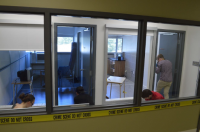 Intended to offer a review of everything learned during an undergraduate degree, the Crime Scene Lab has both a wet room (meant to simulate a kitchen, bathroom, etc.) and an adjoining dry room (den, bedroom, or living room), which can be either connected to or separated from each other though a common corridor.
Intended to offer a review of everything learned during an undergraduate degree, the Crime Scene Lab has both a wet room (meant to simulate a kitchen, bathroom, etc.) and an adjoining dry room (den, bedroom, or living room), which can be either connected to or separated from each other though a common corridor.
 This lab is a professional photography studio reserved for reproducing photos of items and traces presented for analysis. It has a bottomless table, a light table, two lightboxes, four professional 1100W flashes, each powered by two power packs, four 6500K lights, two Lumahawks (continuous 1200W at 6500K), reflectors, and deflectors.
This lab is a professional photography studio reserved for reproducing photos of items and traces presented for analysis. It has a bottomless table, a light table, two lightboxes, four professional 1100W flashes, each powered by two power packs, four 6500K lights, two Lumahawks (continuous 1200W at 6500K), reflectors, and deflectors.
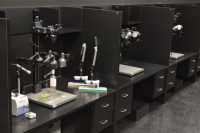 This dark lab with 12 fully equipped workstations (photographic columns, still cameras, monochromatic lamps, excitation and emission filters) allows users to record raw and revealed traces using optical techniques based on selective absorption and luminescence (fingerprints, footwear traces, tool marks, contaminants, etc.).
This dark lab with 12 fully equipped workstations (photographic columns, still cameras, monochromatic lamps, excitation and emission filters) allows users to record raw and revealed traces using optical techniques based on selective absorption and luminescence (fingerprints, footwear traces, tool marks, contaminants, etc.).
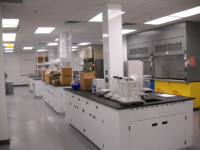 This lab has been designed for the examination of various forms of physical, chemical, and biological traces that students and researchers will encounter. It is safe and equipped with all the supplies an organic chemist requires (lab glassware, balances, ultrasonic cleaners, shakers, fume hoods, ovens, etc.), including two cyanoacrylate fuming tanks, a vacuum fuming tank (donation from the provincial police force), and a microtome.
This lab has been designed for the examination of various forms of physical, chemical, and biological traces that students and researchers will encounter. It is safe and equipped with all the supplies an organic chemist requires (lab glassware, balances, ultrasonic cleaners, shakers, fume hoods, ovens, etc.), including two cyanoacrylate fuming tanks, a vacuum fuming tank (donation from the provincial police force), and a microtome.
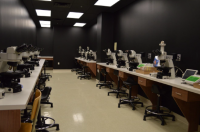 This lab has been designed to observe and analyze samples (fibres, soil, glass, paint chips) through different levels of magnification, and their comparative identification by polarization microscopy. Data can be recorded on a dedicated system thanks to a set of cameras and focal tubes and professional camera equipment. The lab also has a microtome, 11 stereo microscopes, and 12 optic microscopes.
This lab has been designed to observe and analyze samples (fibres, soil, glass, paint chips) through different levels of magnification, and their comparative identification by polarization microscopy. Data can be recorded on a dedicated system thanks to a set of cameras and focal tubes and professional camera equipment. The lab also has a microtome, 11 stereo microscopes, and 12 optic microscopes.
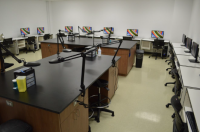 In the concept of a specific training for forensics, lab 3132 is the place where evidence is submitted and students perform their first observations and analyzes to determine the appropriate analytical strategy for the inquiry. It is also where testing is completed by consulting the analytical data for the profile’s requirements and the drafting of various reports.
In the concept of a specific training for forensics, lab 3132 is the place where evidence is submitted and students perform their first observations and analyzes to determine the appropriate analytical strategy for the inquiry. It is also where testing is completed by consulting the analytical data for the profile’s requirements and the drafting of various reports.
Attention - Votre version d'Internet Explorer est vieille de 21 ans et peut ne pas vous offrir une expérience optimale sur le site du CICC. Veuillez mettre à jour votre ordinateur pour une expérience optimale. Nous vous recommandons Firefox ou Chrome, ou encore ChromeFrame si vous êtes dans un environnement corporatif ou académique dans lequel vous ne pouvez pas mettre à jour Internet Explorer.